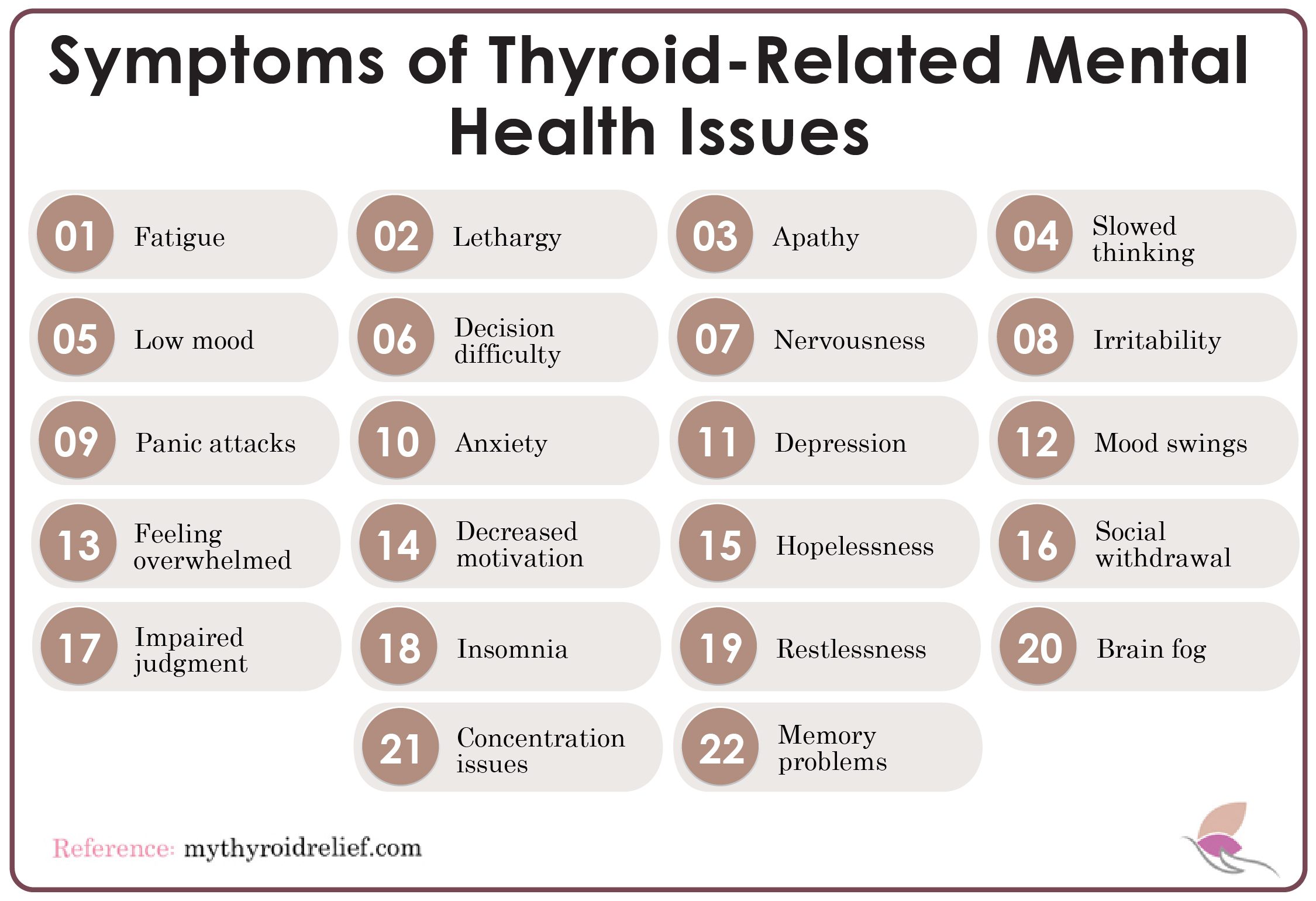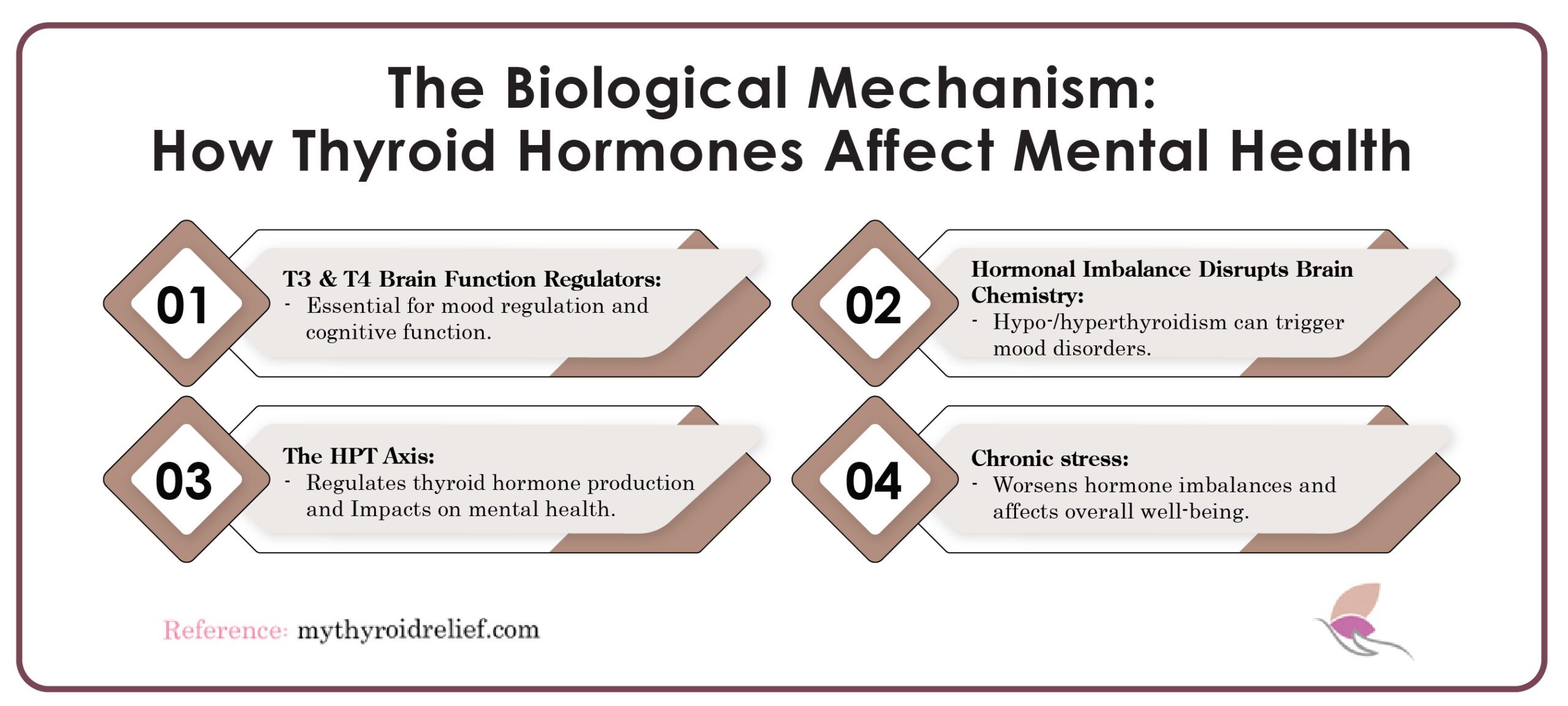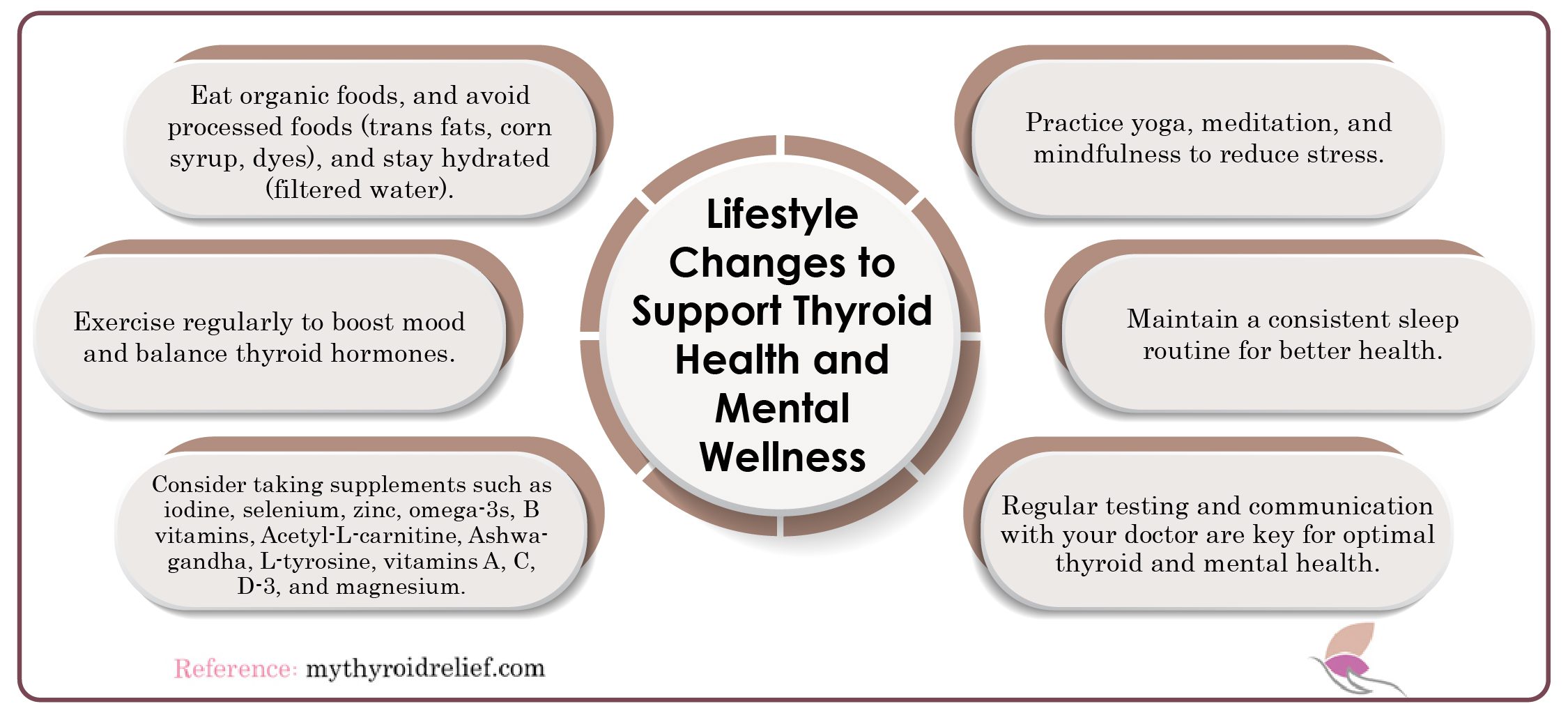
Thyroid health plays a pivotal role in overall well-being. It is essential for maintaining both physical and mental wellness, as it directly influences several key bodily functions, including metabolism, energy regulation, and mood stability. The thyroid gland produces hormones that play a vital role in mental wellness by affecting neurotransmitters and brain health. When the thyroid is not functioning properly, it can lead to imbalances in these hormones, resulting in various mental health challenges, such as anxiety, depression, and cognitive difficulties.
A healthy thyroid supports stable energy levels and emotional balance, helping individuals better manage stress and maintain mental clarity. On the other hand, thyroid imbalances can amplify feelings of stress and anxiety, creating a feedback loop that impacts overall mental wellness. This article explores the intricate relationship between thyroid function and mental health, examining how thyroid disorders can lead to emotional and cognitive challenges. Understanding this connection is essential for developing effective management strategies for individuals experiencing thyroid dysfunction.
The Link Between Thyroid Disorders and Mental Health

Thyroid disorders can have profound effects not only on physical health but also on mental well-being. The thyroid gland plays a significant role in regulating mood, emotions, and cognitive functions due to the essential hormones it produces, which directly influence brain chemistry and the central nervous system. When the thyroid is underactive (hypothyroidism) or overactive (hyperthyroidism), these hormonal imbalances can lead to a wide array of mental health symptoms, including depression, anxiety, mood swings, and cognitive difficulties.
1. Hypothyroidism and Depression
Hypothyroidism, or an underactive thyroid, occurs when the thyroid gland does not produce enough hormones. This deficiency can lead to a range of symptoms, including fatigue, weight gain, and sensitivity to cold. However, its impact on mental health is particularly significant, as hypothyroidism is closely linked to depression. Individuals with low thyroid hormone levels may experience depressive symptoms such as persistent low mood, feelings of worthlessness or guilt, and diminished interest in activities once enjoyed. They may also suffer from decreased motivation and energy levels.
The biological mechanism behind this connection involves decreased neurotransmitter production, particularly serotonin, which is vital for mood regulation. In addition, thyroid hormones influence the brain’s neuroplasticity, or its ability to adapt and change in response to new information and stressors, which is crucial for emotional resilience. When thyroid hormone levels are low, the brain’s capacity to respond to stress and emotional challenges is diminished, leading to feelings of despair and lethargy.
Studies have shown that individuals with untreated hypothyroidism are at a significantly higher risk of developing major depressive disorder. Treatment with thyroid hormone replacement, such as levothyroxine improves mood and alleviates depressive symptoms. In some cases, doctors use low doses of thyroid hormones as an adjunct therapy in patients with depression resistant to conventional treatments.
2. Hyperthyroidism and Anxiety
Hyperthyroidism is characterized by an overactive thyroid, which results in the overproduction of thyroid hormones. This condition can lead to heightened metabolism, rapid weight loss, and an increased heart rate. Importantly, many individuals with hyperthyroidism experience pronounced mental health effects, particularly anxiety or restlessness. Excess thyroid hormones overstimulate the nervous system, leading to nervousness, irritability, and even panic attacks. Hyperthyroidism-induced anxiety is often marked by racing thoughts, restlessness, an inability to relax, and increased heart palpitations or a sense of panic. The heightened levels of T3 (triiodothyronine) and T4 (thyroxine) hormones trigger an increase in adrenaline, the hormone responsible for the body’s “fight or flight” response. As a result, individuals with hyperthyroidism may feel constantly on edge or easily overwhelmed.
Research indicates that anxiety disorders are highly prevalent among individuals with hyperthyroidism, underscoring the need for holistic treatment approaches that address both the physiological and psychological symptoms. Beta-blockers or anti-anxiety medications may be used alongside thyroid treatments to manage anxiety symptoms. Regulating thyroid hormone levels can significantly reduce feelings of anxiety, improving overall mental well-being.
3. Thyroid Disorders and Cognitive Function
Both hypothyroidism and hyperthyroidism can severely impact cognitive function. The brain relies on stable thyroid hormone levels to support clear thinking, memory, and overall mental sharpness. When thyroid hormone levels are imbalanced, cognitive abilities may suffer, often leading to difficulties with memory retention, concentration, and mental clarity.
In hypothyroidism, cognitive impairment often manifests as “brain fog,” where individuals feel mentally sluggish and slow. Memory lapses, difficulties in concentration, and struggles with decision-making are common complaints, as is difficulty in processing information. This cognitive dulling can interfere with everyday tasks, making even simple decisions or conversations feel overwhelming.
On the other hand, individuals with hyperthyroidism may experience racing thoughts, making it difficult to concentrate or focus. Their minds may feel overstimulated, leading to mental exhaustion and errors in tasks requiring sustained attention. This overactivity can strain cognitive functions, resulting in decreased productivity.
Thyroid hormones are also integral in the development and maintenance of synapses, the connections between nerve cells, and the overall architecture of the brain. Research suggests that appropriate treatment of thyroid imbalances can help reverse cognitive symptoms, improving memory, focus, and mental clarity.
4. Emotional Symptoms of Thyroid Disorders
Thyroid dysfunction doesn’t only affect mood disorders like depression or anxiety; it can also lead to a broad range of emotional symptoms, including mood swings, irritability, and emotional sensitivity. In hypothyroidism, individuals often experience emotional blunting or dullness, feeling disconnected from their surroundings. They may find it harder to express emotions or react appropriately in social situations, sometimes appearing indifferent or detached. In contrast, individuals with hyperthyroidism may find themselves more easily agitated or reactive. Small annoyances can trigger disproportionately intense emotional responses, and they may have trouble controlling their temper. Emotional volatility is common in hyperthyroidism, with feelings of frustration, anger, or even emotional outbursts occurring frequently.
Recognizing these emotional changes is crucial for addressing the underlying thyroid issues. Emotional symptoms caused by thyroid disorders can affect relationships, work performance, and overall quality of life. Without proper treatment, these symptoms may exacerbate feelings of isolation, stress, or low self-esteem, further contributing to mental health challenges.
Symptoms of Thyroid-Related Mental Health Issues

Thyroid disorders can manifest in a wide range of mental health and cognitive symptoms. These issues often go unnoticed or are mistaken for other conditions like depression or anxiety. Understanding the mental health symptoms specific to thyroid dysfunction is essential for appropriate diagnosis and treatment. Some of the key symptoms include:
1. Fatigue and Lethargy: Persistent tiredness that doesn’t improve with rest, often leaving individuals feeling physically and mentally sluggish. This overwhelming exhaustion can make even simple tasks seem impossible, severely impacting daily life.
2. Apathy, Low Mood, and Depression: Hypothyroidism often results in reduced interest or enthusiasm for activities, accompanied by chronic sadness, hopelessness, and emotional numbness. This combination can closely mimic symptoms of clinical depression, largely driven by decreased serotonin levels.
3. Difficulty in Decision-Making, Impaired Judgment, and Slowed Thinking: Cognitive processes slow down, making decision-making difficult and creating sensations of being “paralyzed”. This mental sluggishness can lead to frustration and poor judgment, leaving people feeling out of sync with their normal cognitive pace.
4. Nervousness, Anxiety, and Panic Attacks: Hyperthyroidism may trigger excessive worry, anxiety, or disproportionate fears that lead to a constant state of arousal. In more severe cases, this can escalate into panic attacks with symptoms like rapid heart rate and shortness of breath, significantly affecting thyroid health and mental wellness.
5. Irritability and Mood Swings: Those with thyroid imbalances may experience sudden emotional outbursts, irritability, and volatile moods. These unpredictable mood swings can strain relationships and add to feelings of instability.
6. Insomnia and Restlessness: Hyperthyroidism often disrupts sleep patterns, making it difficult to fall or stay asleep. This, combined with a constant need to move or fidget, can result in both physical and mental agitation, contributing to ongoing fatigue.
7. Brain Fog, Difficulty Concentrating, and Poor Memory: Individuals with thyroid issues often experience mental fog, difficulty focusing on tasks, and forgetfulness. This can negatively affect work, school, and even daily household responsibilities, thereby making routine activities feel overwhelming.
8. Decreased Motivation and Social Withdrawal: It is common to lack the drive to finish work or interact with others. Many people with thyroid issues pull away from social interactions due to fatigue, anxiety, or low mood, though addressing thyroid health can improve motivation and re-engagement with life.
The Biological Mechanism: How Thyroid Hormones Affect Mental Health

1. Role of T3 and T4 in Brain Function
Thyroid hormones, particularly T3 and T4, play vital roles in brain development and function throughout life. Their influence extends to several critical neurological processes, such as the regulation of neurotransmitter activity. T3 and T4 are essential for the production and regulation of neurotransmitters like serotonin, dopamine, and norepinephrine, all of which are integral to mood regulation and emotional stability. Serotonin is often referred to as the “feel-good” neurotransmitter because of its role in promoting well-being and happiness, while dopamine is crucial for motivation and reward-driven behavior. A deficiency in thyroid hormones can lead to reduced production of these neurotransmitters, which contributes to emotional issues such as depression, low motivation, and irritability.
Thyroid hormones are also involved in the synthesis of myelin, a protective sheath that surrounds nerve fibers in the brain. Myelination ensures efficient transmission of nerve signals across the brain, which is crucial for cognitive function, memory retention, and emotional processing. Without sufficient thyroid hormones, myelination can be impaired, leading to slower signal transmission and the development of cognitive symptoms like brain fog, poor concentration, and slowed thinking.
Also, thyroid hormones influence neuroplasticity, the brain’s ability to adapt and form new connections. Neuroplasticity is vital for emotional resilience, learning, and memory. Low thyroid hormone levels can reduce neuroplasticity, leading to challenges in coping with stress and changes in mental state, making individuals more vulnerable to conditions like depression and anxiety. Imbalances in thyroid hormones can have lasting effects on brain function, with prolonged deficiency potentially leading to structural changes in brain regions responsible for mood regulation and cognition, such as the hippocampus and prefrontal cortex. Addressing thyroid hormone imbalances can, in many cases, reverse or improve these cognitive and emotional challenges.
2. Impact of Imbalanced Thyroid Hormones on Brain Chemistry
When thyroid hormone levels become imbalanced either too high (hyperthyroidism) or too low (hypothyroidism), the brain’s neurochemical environment is significantly affected, leading to various mental health symptoms. In cases of insufficient thyroid hormone production, the brain experiences a decrease in the availability of crucial neurotransmitters. This results in depressive symptoms, such as low mood, lethargy, and apathy. Individuals may also experience cognitive impairments, such as slowed thinking and difficulty concentrating, which further contribute to emotional distress.
Excessive thyroid hormone production, on the other hand, overstimulates the nervous system, leading to heightened anxiety, restlessness, and irritability. Individuals with hyperthyroidism often report racing thoughts, excessive worry, and an inability to calm down. This overstimulation can also lead to panic attacks and insomnia, further deteriorating mental well-being. In extreme cases, elevated thyroid hormone levels can trigger mood swings and even manic-like behavior. Imbalanced thyroid hormones can also disrupt the body’s normal stress response. For instance, people with hypothyroidism may have difficulty managing stress, and feeling overwhelmed by minor challenges, while those with hyperthyroidism may feel constantly “on edge” and experience heightened sensitivity to stress. This disruption in stress management can exacerbate mental health symptoms and lead to a vicious cycle of anxiety and mood instability.
The biological changes caused by thyroid hormone imbalances emphasize the need for timely intervention and treatment to restore hormonal equilibrium and improve mental health.
3. The Hypothalamus-Pituitary-Thyroid (HPT) Axis
The Hypothalamus-Pituitary-Thyroid (HPT) axis is the regulatory feedback loop that governs the production and release of thyroid hormones. This system is essential for maintaining thyroid balance and, by extension, mental health. The hypothalamus, located in the brain, releases thyrotropin-releasing hormone (TRH) when it detects low thyroid hormone levels in the blood. TRH signals the pituitary gland to release thyroid-stimulating hormone (TSH) into the bloodstream. TSH then travels to the thyroid gland, where it prompts the production and release of T3 and T4. The thyroid gland responds by increasing or decreasing the production of T3 and T4 based on the levels of TSH in the blood. Once optimal thyroid hormone levels are reached, this information is fed back to the hypothalamus and pituitary to adjust further hormone production, maintaining balance.
Any disruption in the HPT axis, whether due to genetic factors, autoimmune diseases (such as Hashimoto’s thyroiditis or Graves’ disease), or external stressors, can result in thyroid dysfunction. In turn, this affects both physical and mental health. For example, chronic stress can lead to dysregulation of the HPT axis, causing reduced or excessive thyroid hormone production, which then worsens mental health symptoms like anxiety, depression, and cognitive dysfunction.
4. Chronic Stress and Its Impact on the HPT Axis
Chronic stress is a significant factor in the dysregulation of the HPT axis. Long-term stress triggers the release of cortisol, a hormone produced by the adrenal glands. Elevated cortisol levels can interfere with TRH and TSH production, disrupting the delicate balance of the HPT axis and leading to thyroid hormone imbalances. This not only affects thyroid function but also exacerbates mental health symptoms, creating a cycle in which stress worsens both thyroid health and emotional well-being.
Stress management is, therefore, a critical component of treating thyroid-related mental health issues. Mindfulness practices, relaxation techniques, and ensuring adequate sleep are all ways to reduce the negative impact of stress on thyroid function and mental health.
Lifestyle Changes to Support Thyroid Health and Mental Wellness

1. Dietary Adjustments for Thyroid and Mental Wellness
A balanced diet is vital in supporting both thyroid health and mental well-being. Nutrients like iodine, selenium, and omega-3 fatty acids are essential for thyroid hormone production and brain function. To enhance your thyroid and mental health, incorporate nutrient-dense foods such as fatty fish, nuts, seeds, and leafy greens. Whole grains, fruits, and vegetables are also important for stabilizing blood sugar, which helps regulate mood and energy.
It’s equally crucial to limit processed foods and sugars, which can cause energy crashes and irritability. Opt for organic chicken, turkey, lean grass-fed meats, wild seafood, and low-glycemic fruits and vegetables. These choices nourish your body and help you avoid harmful additives, dyes, and fillers that could impact your mental health. Also, avoid toxins and heavy metals in food, drinks, dental work, and dairy products like makeup and hygiene items, as these can affect brain function and mood stability.
2. Stress Management Techniques
Stress can significantly impact thyroid function and mental health. Incorporating stress management techniques such as yoga, meditation, and mindfulness can help lower stress levels and support overall well-being. These practices promote relaxation and improve emotional resilience, benefiting both thyroid health and mental clarity. Other stress-reduction methods include engaging in hobbies, spending time in nature, and building strong social connections, all of which contribute to a healthier mental state.
3. Exercise and Its Benefits
Regular physical activity is essential for maintaining both thyroid function and mental wellness. Exercise stimulates the release of endorphins, which can enhance mood and reduce anxiety. Low-intensity strength training, including Pilates and weightlifting, plays a crucial role in this process as it helps regulate thyroid hormone levels, contributing to overall well-being. Aim for at least 150 minutes of moderate-intensity exercise each week, incorporating activities like brisk walking, cycling, or swimming. Also, strength training is beneficial for building muscle mass and enhancing metabolic function, leading to a healthier body and mind.
4. Sleep Hygiene
Adequate sleep is vital for both thyroid health and emotional well-being. Sleep disturbances can worsen thyroid issues and impact mental health. To promote better sleep, keep the room cool, limit screen time, and ensure devices are out of the bedroom or placed in a far corner from your bed. Creating a dark, quiet environment also encourages restful sleep. Establishing a consistent bedtime routine and incorporating relaxation techniques, such as deep breathing exercises, can help you fall asleep faster. Take magnesium glycinate to support sleep, and aim to go to bed at least four hours after eating. Avoiding high-sugar or carbohydrate-heavy meals late at night. These steps can greatly enhance both your thyroid health and emotional balance.
5. Supplements for Thyroid Health and Mental wellness
Supplements can support thyroid function and improve mental clarity, particularly when nutrient deficiencies or thyroid imbalances are present. Key supplements include acetyl-L-carnitine, which may improve cognitive function in people with hyperthyroidism; selenium, essential for converting thyroid hormones and protecting the thyroid from damage; zinc, which supports thyroid hormone production and cognitive function; magnesium, known for helping stabilize mood and reduce stress; and ashwagandha, which can balance thyroid hormones and alleviate stress-related symptoms. Other helpful supplements for mental clarity include omega-3 fatty acids, vitamin D-3, and B vitamins, all linked to improved mood and cognitive function. L-tyrosine, an amino acid, may also support thyroid function and cognitive performance, especially during stress. Always consult a healthcare provider before starting any new supplements to ensure they suit your individual health needs.
6. Hormonal Testing and Mental Health Monitoring
Regular testing of thyroid hormones, along with DHEA, pregnenolone, and sex hormones like estrogen, progesterone, and testosterone, is crucial for monitoring thyroid health and mental well-being. Imbalances in these hormones can affect mood, cognition, and energy levels. For women, hormonal declines during perimenopause and menopause can lead to thyroid dysfunction and mental health issues. Similarly, men may experience thyroid and mental health issues as testosterone levels drop with age.
Bioidentical hormone replacement therapy, under medical supervision, may help restore hormonal balance and alleviate symptoms related to thyroid and mental health. Additionally, psychological assessments can offer insights into how thyroid health impacts mental wellness, enabling more targeted treatment approaches. Regular communication with healthcare providers about mental health symptoms helps in developing a comprehensive plan that addresses thyroid health and mental wellness.
References
1. Randi Fredricks(2024). Thyroid Dysfunction And Mental Health: https://www.mentalhealth.com/library/thyroid-dysfunction-and-mental-health
2. Psychological symptoms and thyroid disorders: https://www.btf-thyroid.org/psychological-symptoms-and-thyroid-disorders
3. Hope Gillette(2024). Does Hypothyroidism Affect Your Mental Health?: https://www.healthline.com/health/hypothyroidism-and-mental-health
This is such an insightful article! I had no idea how much thyroid health could impact mental well-being. Thanks for breaking it down in such a clear way!